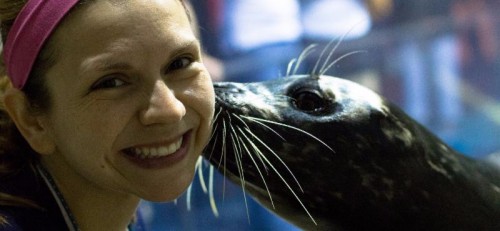
It is with great sadness that we share the news of the death of Presley the Harbor Seal. She died overnight this past week from an Upper Gastric Torsion. This condition can informally be described as the twisting of the stomach that was likely caused by movement or something the animal unknowingly did to itself. As was the case with Presley, it can occur suddenly and without symptoms. At home, some of us may be familiar with the condition as it is fairly common with dogs. Some animals can endure chronic, long-term battles with Gastric Torsion without relief. In Presley case, she had no symptoms and her behavior and appetite were normal throughout the day.
Presley was born in 2005 at the Memphis Zoo. In 2006, we opened our doors and hearts to her as the ideal companion for our Harbor Seal named Porter. Porter is a rescue animal found off the coast of Maine and ineligible for release to the wild. Although Porter had Fur Seals and Sea Lions in his North Pacific Exhibit, the addition of Presley provided better companionship from another seal of the same species for a more natural situation.
Together, the two Harbor Seals bonded and were active and playful in their exhibit. In 2011, the pair had a seal pup named Riley. Riley currently lives at the Gladys Porter Zoo in Brownsville, Texas. Presley and Porter have been a favorite among guests who have come to visit them at the Aquarium Pyramid for nine years. As the staff mourns the loss of this beautiful animal, we know she will be greatly missed by our guests as well. She will be remembered for her gregarious nature and the joy that she brought to so many of us.
Although the Aquarium Pyramid is currently closed for the first phase of renovation, you can watch the seals on our Webcam. You can visit the seals in person when the aquarium temporarily reopens starting November 14, 2015.
Most certainly Presley cannot ever be replaced, but biologists will closely monitor Porter’s behavior and well-being as animals grieve the loss of a companion too. They will work with AZA and the National Marine Fisheries Service to identify a suitable companion.
